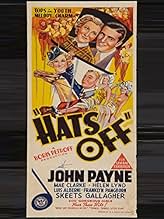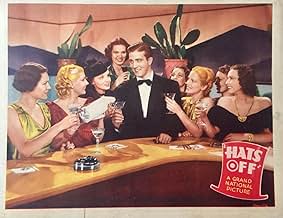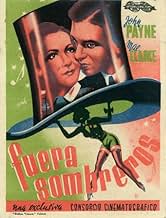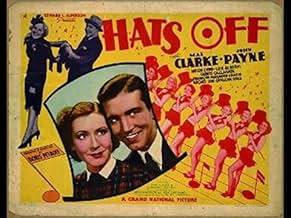AVALIAÇÃO DA IMDb
5,3/10
201
SUA AVALIAÇÃO
Adicionar um enredo no seu idiomaRival press agents Jimmy Maxwell and Jo Allen have both been assigned to stir up publicity for separate exhibitions at the 1936 Texas Centennial.Rival press agents Jimmy Maxwell and Jo Allen have both been assigned to stir up publicity for separate exhibitions at the 1936 Texas Centennial.Rival press agents Jimmy Maxwell and Jo Allen have both been assigned to stir up publicity for separate exhibitions at the 1936 Texas Centennial.
- Direção
- Roteiristas
- Artistas
Richard 'Skeets' Gallagher
- Buzz Morton
- (as Skeets Gallagher)
Franklin Pangborn
- Mr. Churchill
- (as Franklyn Pangborn)
The Radio Rogues
- Comic Trio
- (as The Three Radio Rogues)
Phil Bloom
- Cornerman
- (não creditado)
Ralph Brooks
- Nightclub Patron
- (não creditado)
Wheaton Chambers
- Board Member
- (não creditado)
Avaliações em destaque
I can only hope that there are still Americans like those in this film in today,s USA. The movie gives us one hour of light popular musical enjoyment. John Payne as usual presents a very likable and professional acting performance. Mae Clarke is pretty and charming and I have fond memories of her in other films. Franklin Pangborne contributes his unique comedy talents. It is good to visit a past era when fine human qualities of USA life were presented to the world via the Movies and universally admired.. Of course, much that was unpleasant was rarely shown but at least we can take a break from the worries of modern life and just relax and enjoy one hour of escape.
Two cities in Texas are fierce rivals. They are each producing expositions to boost themselves and hire publicity men. One is John Payne. The other is Mae Clarke -- well, they thought they were getting a man. Miss Clarke hires Franklin Pangborn to be "him" and goes to spy on Brennan under her own name.
It's not the missing Laurel & Hardy short. Instead it is, for Grand National, a big-budget musical, with Busby Berkley style production numbers. Besides Payne in his second movie credit and first leading role, it's notable for being Samuel Fuller's first screen credit as a writer.
Those two firsts and Luis Alberni aside -- he plays a big show producer -- this movie, while always engaging, substitutes bombast for wit. The performances are good: Miss Clarke acts the business woman by being business-like and straightforward; Mr. Payne is, surprisingly for him, a tenor, both in speaking and singing. Yes, it's a musical with John Payne and he sings, despite being a baritone in those musicals with Betty Grable.
It's not the missing Laurel & Hardy short. Instead it is, for Grand National, a big-budget musical, with Busby Berkley style production numbers. Besides Payne in his second movie credit and first leading role, it's notable for being Samuel Fuller's first screen credit as a writer.
Those two firsts and Luis Alberni aside -- he plays a big show producer -- this movie, while always engaging, substitutes bombast for wit. The performances are good: Miss Clarke acts the business woman by being business-like and straightforward; Mr. Payne is, surprisingly for him, a tenor, both in speaking and singing. Yes, it's a musical with John Payne and he sings, despite being a baritone in those musicals with Betty Grable.
I was wondering why John Payne looked like and acted like Jimmy Stewart in this movie. I think it was because 1936 was Stewart's break out year. He starred in four movies and had good parts in four more. His career was exploding. Somebody probably saw Payne and figured people would think he was Stewart. Payne never quite reached Stewart's level of super-stardom, but he seemed to have a greater acting range, playing tough guys as easily as sweetheart roles. Here, he is quite affable and charming. One wishes he had more screen time. This is also Sam Fuller's first screenplay. I am not that familiar with Fuller's corpus except for some of his major works - "The Big Red One," "Shock Corridor" "The Naked Kiss" and "Pick Up on South Street." This seems quite different from the other works that I've seen by him, much lighter in tone. Mae Clarke is dull and Helen Lynn does seem to be doing a Gracie Allen imitation. Only Luis Alberni as Rosero hits the right notes to brighten the film a bit. The other characters are not given enough screen time to make a solid impression. This is just passable and I think only John Payne fans would really be interested enough to watch the whole thing.
Grand National, that very modern but mismanaged Hollywood mini major from just 1935-38, looked like they just might give Republic and Universal and Columbia a serious run for their place in the mid thirties. Lucky enough to score James Cagey for a few films: GREAT GUY and SOMETHING TO SING ABOUT, this funny lively well made musical ....a bit like WHOOPEE and pre-empting GIRL CRAZY showed they meant box office business in all forms of films..from tough guy pix to westerns and musical combos of both. HATS OFF is a modern day musical about publicity, a female reporter spying on a rival town's major business and manufacturing show... and falling for the architect played by a very young and handsome John Payne. It sort of loses the thread of the story about 2/3 of the way through but it is a very likable film with terrific sets and costumes especially in the nightclub musical scenes.
Sadly they went broke by overspending on their Cagney musical SOMETHING (above) and lost $800k. they never recovered and went out of the biz in 1939. Their studio became PRC. Had Grand National survived, they would have lasted well into the TV era and produced a lot of solidly made films. Check that logo! one of the best and most exciting ever on the front of any film!
Sadly they went broke by overspending on their Cagney musical SOMETHING (above) and lost $800k. they never recovered and went out of the biz in 1939. Their studio became PRC. Had Grand National survived, they would have lasted well into the TV era and produced a lot of solidly made films. Check that logo! one of the best and most exciting ever on the front of any film!
A couple of cities which sound an awful lot like Dallas and Fort Worth in real life take their rivalry quite seriously. Both are planning big expositions wanting to be chosen as the site of a planned World's Fair.
John Payne plays the organizer for the show of one of the cities and Mae Clarke is sent in to spy on him for the other. Of course the inevitable happens, need I go any farther.
The songs are provided by the team of Ben Oakland and Herbert Magdison and one of them, Twinkle Twinkle Little Star did enjoy some minor success during the time.
This was Payne's second feature film and first lead after being spotted in a minor role in Dodsworth. He'd have to wait for a few years before hitting the big time with 20th Century Fox.
Maybe this might have faired better at a major studio, but this was Grand National Pictures. As it is it's pleasant enough entertainment but nothing spectacular.
John Payne plays the organizer for the show of one of the cities and Mae Clarke is sent in to spy on him for the other. Of course the inevitable happens, need I go any farther.
The songs are provided by the team of Ben Oakland and Herbert Magdison and one of them, Twinkle Twinkle Little Star did enjoy some minor success during the time.
This was Payne's second feature film and first lead after being spotted in a minor role in Dodsworth. He'd have to wait for a few years before hitting the big time with 20th Century Fox.
Maybe this might have faired better at a major studio, but this was Grand National Pictures. As it is it's pleasant enough entertainment but nothing spectacular.
Você sabia?
- CuriosidadesThis film received its initial USA telecast Sunday 22 February 1942 on New York City's pioneer television station WNBT (Channel 1). On the West Coast its earliest documented telecast took place in Los Angeles Monday 10 March 1947 on Don Lee's still experimental W6XAO (Channel 2); its next airings were in New York City Sunday 18 September 1949 on WPIX (Channel 11), in Cincinnati Thursday 8 December 1949 on WKRC (Channel 11), and in Chicago Saturday 8 April 1950 on WBKB (Channel 4).
Principais escolhas
Faça login para avaliar e ver a lista de recomendações personalizadas
Detalhes
- Tempo de duração1 hora 6 minutos
- Cor
- Proporção
- 1.37 : 1
Contribua para esta página
Sugerir uma alteração ou adicionar conteúdo ausente























